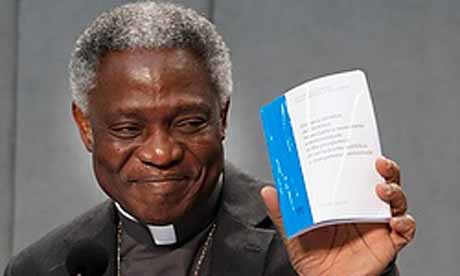The Pontifical Council for Justice and Peace has released a document calling for a radical reform of the world’s financial and monetary system. It also proposed the creation of a global political authority to manage the economy and a new world economic order based on ethics.
The note, entitled “Towards reforming the international financial and monetary systems in the context of the global public authority”, was presented to journalists at a press conference today presided over by the President of the Council, Cardinal Peter Turkson.
Cardinal Turkson told reporters that the document was also a way of giving a voice to the voiceless.
“Definitely, that’s part of it and in fact in asking the G20 to pay attention to this or currently start doing a reflection in this direction, it is actually in view of those who suffer from this phenomenon, so giving a voice to the voiceless, that’s what it is”.
The proposal, which is not a papal document, suggests that the reform process might begin with the United Nations as a point of reference.
“On the way to building a more fraternal and just human family and, even prior to that, a new humanism open to transcendence, Blessed John XXIII’s teaching seems especially timely. In the prophetic Encyclical Letter Pacem in Terris of 1963, he observed that the world was heading towards ever greater unification. He then acknowledged the lack of correspondence in the human community between political organization “on a world level and the objective needs of the universal common good”. He also expressed the hope that one day “a true world political authority” would be created.
“Consistent with the spirit of Pacem in Terris, Benedict XVI himself expressed the need to create a world political authority. This seems obvious if we consider the fact that the agenda of questions to be dealt with globally is becoming ever longer. Think, for example, of peace and security; disarmament and arms control; promotion and protection of fundamental human rights; management of the economy and development policies; management of migratory flows and food security; and protection of the environment. In all these areas, the growing interdependence between States and regions of the world becomes more and more obvious as well as the need for answers that are not just sectorial and isolated, but systematic and integrated, rich in solidarity and subsidiarity and geared to the universal common good.”
Source
- Vatican Radio
- The Deacon’s Bench
- Image Catholic Free Press (CNS photo/Paul Haring)
